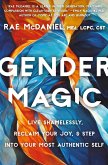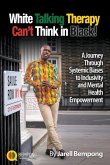We hear about gender dysphoria and transgenderism daily in the media (from the print media and television to the many podcasts available on YouTube and its ilk) and sexual trans this and sexual trans that. The discussion is varied and ever-present it seems nowadays. And the content is often rife with strident voices expressing a host of reactions to all things "gender dysphoria" and "transgender." It is, as some might say, "a problem without a solution." I am a Doctor of Philosophy, not an M.D., and had only a superficial awareness, and no real understanding at all, of what the discussion was all about; what it means to be transgender; what is meant by gender dysphoria; or about the who and why and what does it mean on a personal level to those of us who are not so afflicted. Nor did I have any inkling of the extent to which our society, culture, and educational institutions--from grade school to high school to our colleges and universities, as well as across the medical and legal professions--have become deeply embroiled in the ethical and moral use of puberty blockers, intersex surgical remedies, and a host of other treatment processes designed to alleviate the suffering and anxiety-physical and psychological-that thousands of Americans of all ages and backgrounds experience daily as a result of medical and psychological diagnoses of suffering from gender dysphoria and/or transgenderism. As the author of many books on various aspects of AI itself, I also wondered what AI would have to say about various aspects of the broad topics of gender dysphoria and transgenderism in all of their many thoroughly documented and well known manifestations. This book is by no means intended to be authoritative or all-encompassing in its exploration of the importance of gender dysphoria and transgenderism. Rather, the book is the result of several hours I spent posing various questions to the AI tool about: * what are the definitions of gender dysphoria and transgenderism? * how, why, and when does gender dysphoria and transgenderism occur? * what is the medical community's view on diagnosing gender dysphoria and transgenderism? * what are the leading medical treatments used to address the conditions of gender dysphoria and transgenderism? * what are the political, legal, and cultural factors informing the debates about treating with drugs and/or surgery pre-pubescent children who manifest in one way one another "gender dysphoria"? * why should I--an XY who has never experienced any degree of gender dysphoria beyond the "normal" questions a boy from Cincinnati growing up in the 1940s and 50s might have thought about from time to time--care about the topic one way or another? Finally, a word about the organizing principle that informs the content of this short book: there is none! The book is a protean, almost stream of consciousness work of exploration. In many ways it is a bit repetitive as I plug away with AI, trying to refine my questions, thinking of slightly different ways to ask the same basic questions. >So the book is, for better or worse, organically protean in this respect, and, in this respect, perhaps I am doing an authorial disservice to you, the reader. If so, I ask you to consider the steepness, and often slippery terrain, making up the hill I was attempting to climb. Accept my apologies, please, if you find the Q&A process to be a bit haphazard, perhaps even to the point that you angrily toss the book aside and mutter, "How dare he think I will subject myself to his authorial incompetence, to his muddle-headedness, causing me to suffer a severe case of "reader dysphoria."
Bitte wählen Sie Ihr Anliegen aus.
Rechnungen
Retourenschein anfordern
Bestellstatus
Storno








